2021中考英语复习语法精讲:代词课件31张
文档属性
| 名称 | 2021中考英语复习语法精讲:代词课件31张 | 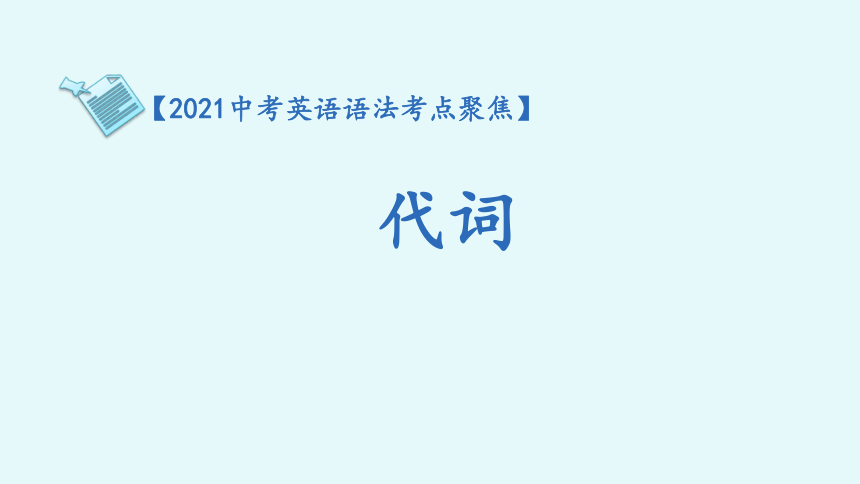 | |
| 格式 | pptx | ||
| 文件大小 | 605.4KB | ||
| 资源类型 | 教案 | ||
| 版本资源 | 通用版 | ||
| 科目 | 英语 | ||
| 更新时间 | 2021-04-06 18:07:24 | ||
图片预览

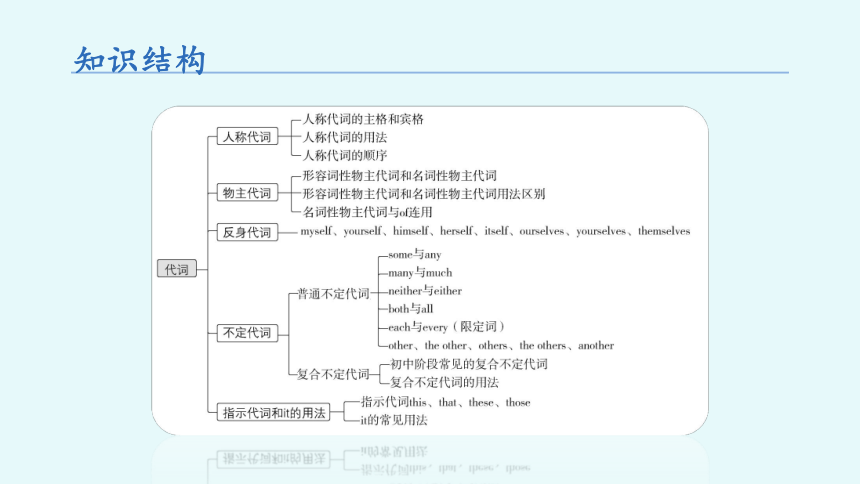
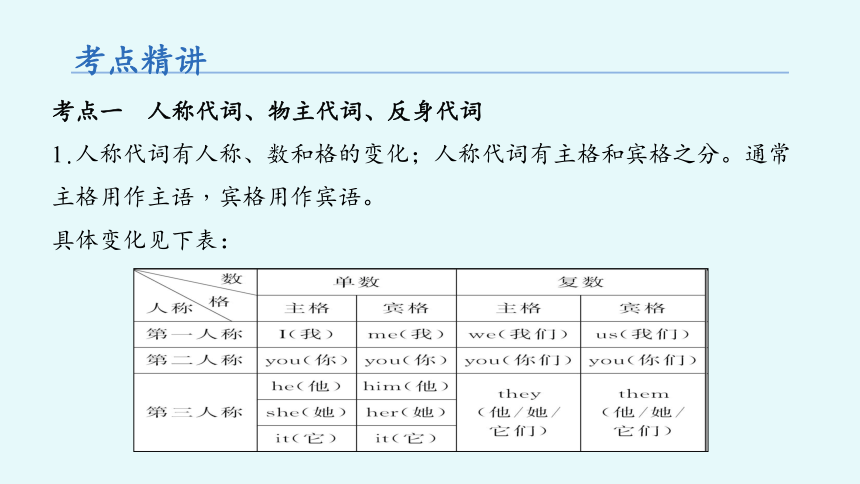
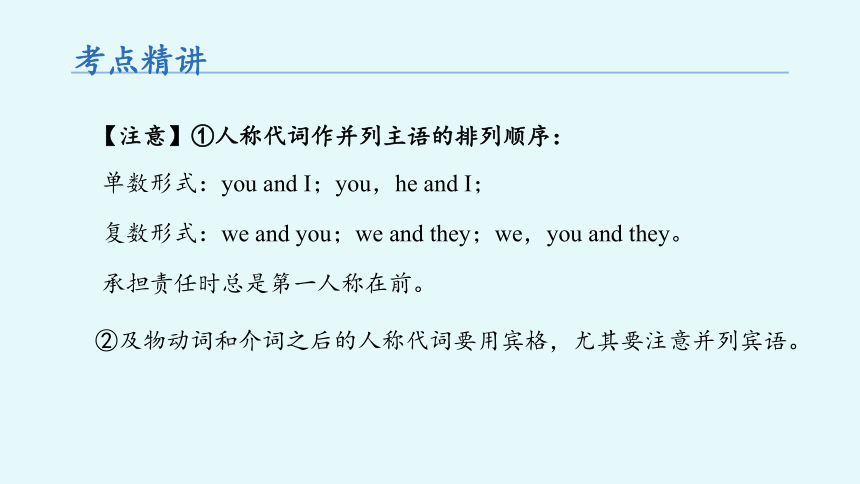
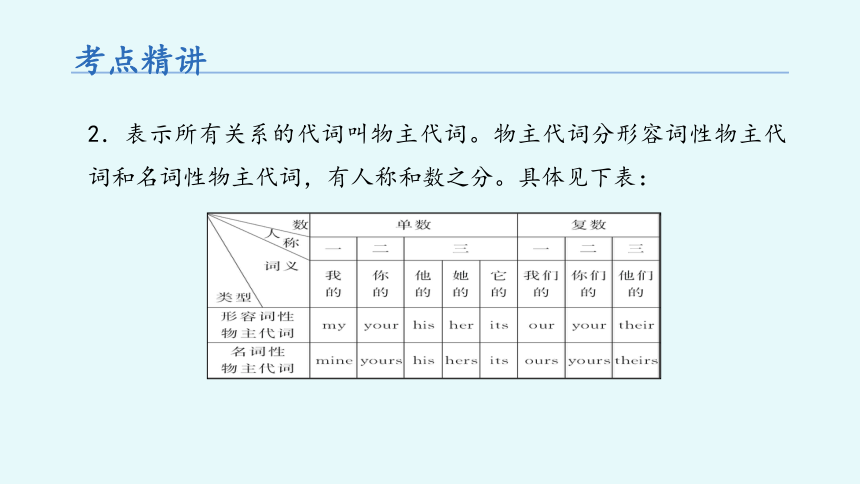
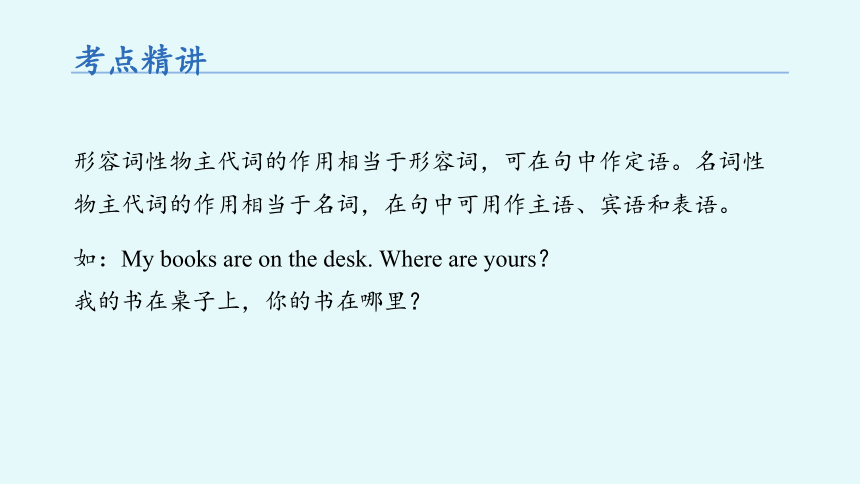
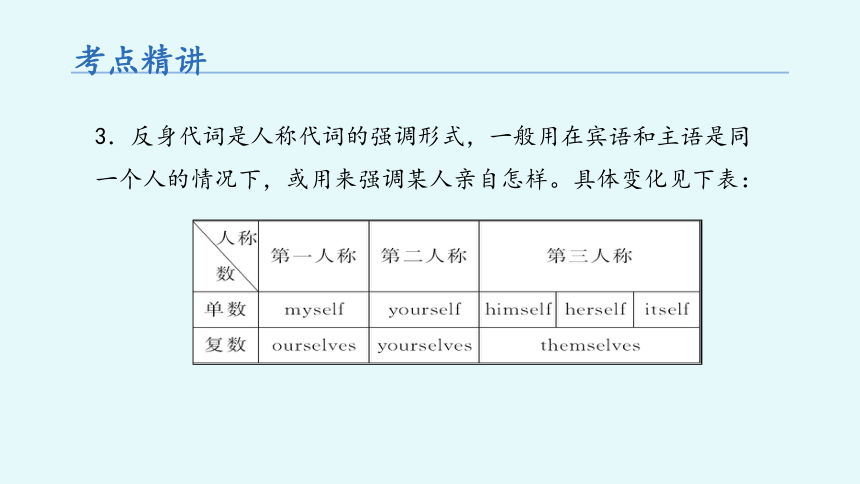
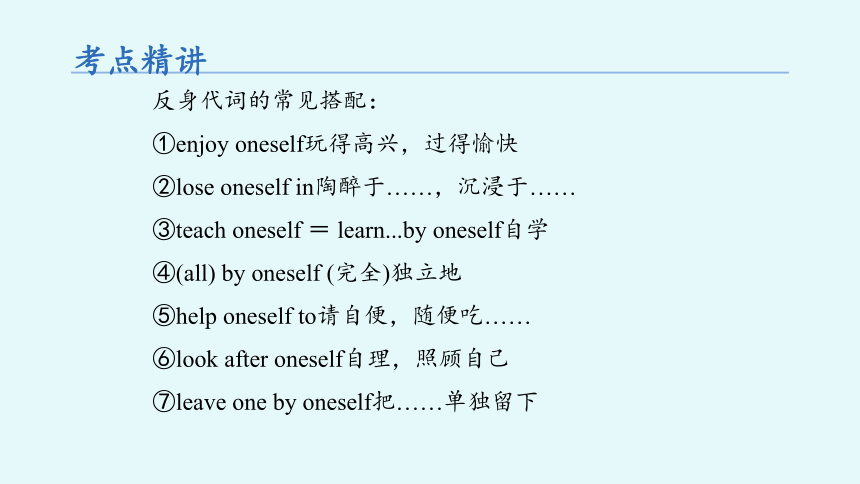
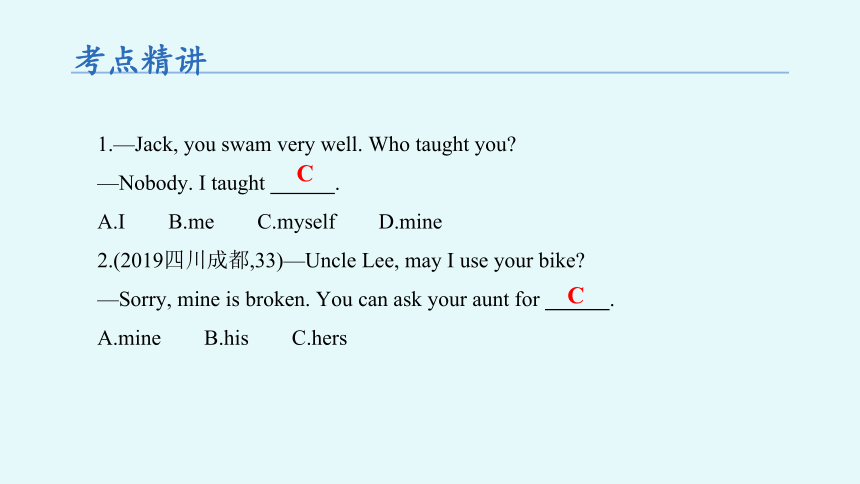
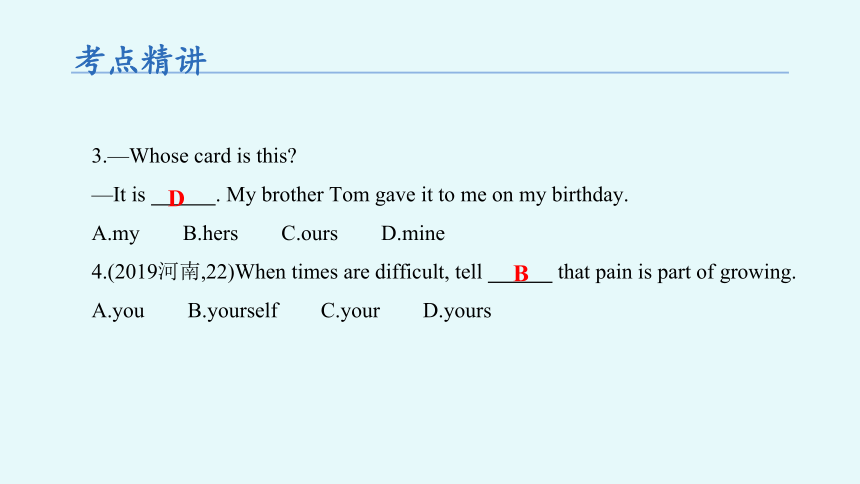
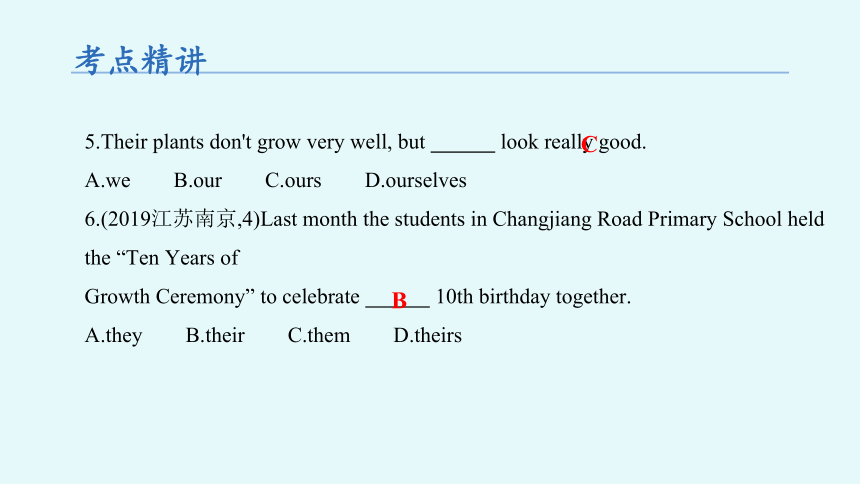
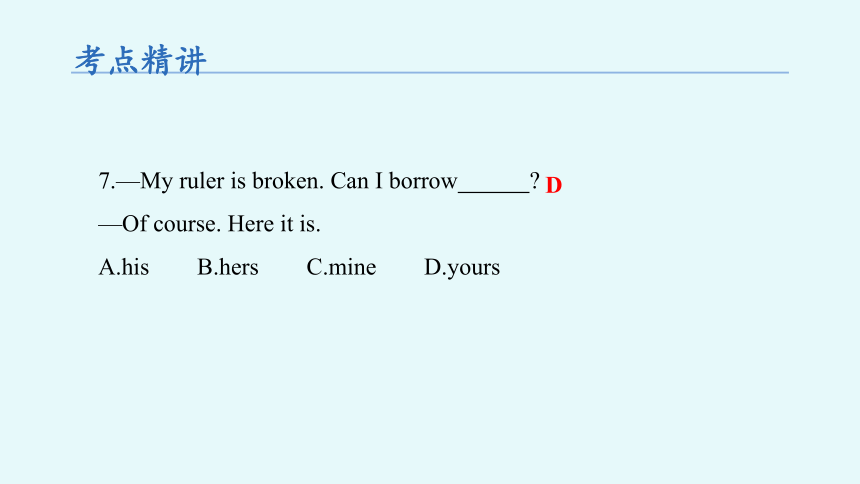
文档简介
【2021中考英语语法考点聚焦】
代词
知识结构
考点一 人称代词、物主代词、反身代词
1.人称代词有人称、数和格的变化;人称代词有主格和宾格之分。通常主格用作主语,宾格用作宾语。
具体变化见下表:
考点精讲
【注意】①人称代词作并列主语的排列顺序:
单数形式:you and I;you,he and I;
复数形式:we and you;we and they;we,you and they。
承担责任时总是第一人称在前。
②及物动词和介词之后的人称代词要用宾格,尤其要注意并列宾语。
考点精讲
2.表示所有关系的代词叫物主代词。物主代词分形容词性物主代词和名词性物主代词,有人称和数之分。具体见下表:
考点精讲
形容词性物主代词的作用相当于形容词,可在句中作定语。名词性物主代词的作用相当于名词,在句中可用作主语、宾语和表语。
如:My books are on the desk. Where are yours?
我的书在桌子上,你的书在哪里?
考点精讲
3.反身代词是人称代词的强调形式,一般用在宾语和主语是同一个人的情况下,或用来强调某人亲自怎样。具体变化见下表:
考点精讲
反身代词的常见搭配:
①enjoy oneself玩得高兴,过得愉快
②lose oneself in陶醉于……,沉浸于……
③teach oneself = learn...by oneself自学
④(all) by oneself (完全)独立地
⑤help oneself to请自便,随便吃……
⑥look after oneself自理,照顾自己
⑦leave one by oneself把……单独留下
考点精讲
1.—Jack, you swam very well. Who taught you?
—Nobody. I taught ????.
A.I B.me C.myself D.mine
2.(2019四川成都,33)—Uncle Lee, may I use your bike?
—Sorry, mine is broken. You can ask your aunt for ????.
A.mine B.his C.hers
考点精讲
C
C
3.—Whose card is this?
—It is ????. My brother Tom gave it to me on my birthday.
A.my B.hers C.ours D.mine
4.(2019河南,22)When times are difficult, tell ???? that pain is part of growing.
A.you B.yourself C.your D.yours
D
B
考点精讲
5.Their plants don't grow very well, but ???? look really good.
A.we B.our C.ours D.ourselves
6.(2019江苏南京,4)Last month the students in Changjiang Road Primary School held the “Ten Years of
Growth Ceremony” to celebrate ???? 10th birthday together.
A.they B.their C.them D.theirs
C
B
考点精讲
7.—My ruler is broken. Can I borrow ?????
—Of course. Here it is.
A.his B.hers C.mine D.yours
D
考点精讲
some和any均表示“一些”,既可修饰可数名词,也可修饰不可数名词。some一般用于肯定句中,any多用于疑问句、否定句和条件句中。但在疑问句中,当表示说话人希望得到肯定回答或表达请求、建议时应用some。
考点二 不定代词
1.普通不定代词的用法
①some与any
考点精讲
many修饰可数名词复数,还可以与表示程度的副词so,too,as,how连用。
②many与much
much修饰不可数名词,也可以与表示程度的副词so,too,as,how连用。
考点精讲
③either与neither
either指两个人或物中的一个;neither指两个人或物中一个也不,常构成固定搭配either/neither of+名词/代词的复数+谓语动词(第三人称单数形式);当either...or...和neither...nor...连接两个主语时,谓语动词应与离它最近的主语在人称和数上保持一致。
考点精讲
④both与all
both表示“两者都”,常与and连用;all指“三者或三者以上都”,常与of连用。
⑤each与every
each和every都表示“每一个”。each强调个体,当它作主语时,谓语动词用单数形式;every强调整体情况;修饰名词时谓语动词也要用单数形式。另外,each可指两个或两个以上的人或物,而every只可指三个或三个以上的人或物。
考点精讲
⑥(a) few与(a) little
(a) few和(a) little具有名词或形容词的性质,在句中可作主语、宾语、定语等。(a) few与可数名词复数连用;(a) little与不可数名词连用。few和little表示否定,指“几乎没有”,在反意疑问句中尤其要注意;a few和a little指“有一些”,相当于some。
考点精讲
⑦other,the other,others,the others与another
other作形容词,意为“别的,其他的”,常用在单数或复数名词的前面;the other表示已知两个人或事物中的另外一个,表示特指,常与one连用;others表示泛指,意为“其他的人或物”,常用于“some...,others...”结构中;the others表示特指,意为“其他的人或物”;another表示三者或三者以上的另外一个。
考点精讲
2.复合不定代词的用法
①在反意疑问句中,当陈述部分的主语是指人的复合不定代词,如everybody,nobody,anyone等时,疑问部分的主语通常用代词they;当陈述部分的主语是指物的复合不定代词,如everything,anything,something,nothing等时,疑问部分的主语通常用代词it。
考点精讲
②当形容词或else修饰复合不定代词something,everything,everyone等时,形容词或else必须放在这些词的后面。
③everyone的意思等同于everybody,只能指人;every one既可指人也可指物,还可以和of连用。
考点精讲
考点三 指示代词
指示代词包括:this,that,these,those。
①this和these一般用来指在时间或空间上较近的事物或人,that和those则指在时间或空间上较远的事物或人。
②有时that和those指前面提到过的事物,this和these则是指下面将要讲到的事物。如:
I had a cold.That's why I didn't come.我受凉了。那就是为什么我没有来。
考点精讲
③有时为了避免重复提到的名词,常可用that或those代替。
如:Television sets made in Beijing are just as good as those made in Shanghai.
北京做的电视机和上海做的一样好。
④this在电话用语中代表自己,that则代表对方。
如:Hello!This is Mary.Is that Jack speaking?
你好!我是玛丽。你是杰克吗?
考点精讲
考点四 疑问代词、关系代词
疑问代词有who,whom,whose,what和which等。疑问代词用于特殊疑问句中,一般都放在句首,并在句子中作为某一句子成分。
如:Who is going to come here tomorrow?(作主语)
What is that?(作表语)
Whose umbrella is this?(作定语)
Whom are you waiting for?(作宾语)
考点精讲
疑问代词与关系代词的相关用法:
①疑问代词通常位于句首,引出特殊疑问句。
②关系代词用来引导宾语从句或定语从句。what不能用在定语从句中充当关系代词,但that可用在定语从句中作关系代词。宾语从句中的关系代词与疑问代词一致。
考点精讲
③无论是疑问代词还是关系代词,which和what所指范围不同。what所指的范围是无限的,而which则指在一定范围内。如:
Which books do you like best?你最喜欢哪几本书?
What books do you like best?你最喜欢什么样的书?
④whom是who的宾格,在口语中作宾语时,也可用who代替,但在介词后只能用whom。如:
Who(m) did you meet on the street?你在街上遇到谁了?
For whom are you waiting?你在等谁?
考点精讲
1.We haven't got ???? meat for dinner. Let's buy ????chicken.
A.some;some B.some;any C.any;any D.any;some
2.—This room is too small. I'd like to ask for ????.
—Sure. We have rooms available here.
A.another B.the other C.one D.it
D
A
考点精讲
3.—May I help you with some jeans, sir?
—Yes, I'd like to try on those blue ????.
A.one B.pair C.two D.ones
4.Sam finds sweeping robots useful, and he plans to buy ???? for his grandma.
A.it B.one C.this D.that
D
B
考点精讲
5.Could you stay a little longer? I have ???? more to tell
you about the plan for tomorrow.
A.something B.everything C.anything D.nothing
A
考点精讲
知识拓展
1. it作形式主语
不定式、动名词、从句作句子主语时,为了保持句子平衡,通常把它们放在句末,而在句首使用形式主语it。
it用作形式主语的重要句型
①it+be+adj.+for sb.+to do sth.
It is very important for me to learn foreign language.
学一门外语对我来说非常重要。
② It take/took sb. Sometime to do sth.
It took me sometime to finish reading the reading materials.
我花了一些时间才看完阅读材料。
知识拓展
2. it作形式宾语
it作形式宾语常代替不定式、动名词和that 从句,此时将it置于谓语动词之后,不定式、动名词和that从句放在最后。
I find it hard to learn gymnastics.
我发现学体操很难。
I feel it necessary to take plenty of exercise every day.
我觉得每天进行大量的锻炼是有必要的。
代词
知识结构
考点一 人称代词、物主代词、反身代词
1.人称代词有人称、数和格的变化;人称代词有主格和宾格之分。通常主格用作主语,宾格用作宾语。
具体变化见下表:
考点精讲
【注意】①人称代词作并列主语的排列顺序:
单数形式:you and I;you,he and I;
复数形式:we and you;we and they;we,you and they。
承担责任时总是第一人称在前。
②及物动词和介词之后的人称代词要用宾格,尤其要注意并列宾语。
考点精讲
2.表示所有关系的代词叫物主代词。物主代词分形容词性物主代词和名词性物主代词,有人称和数之分。具体见下表:
考点精讲
形容词性物主代词的作用相当于形容词,可在句中作定语。名词性物主代词的作用相当于名词,在句中可用作主语、宾语和表语。
如:My books are on the desk. Where are yours?
我的书在桌子上,你的书在哪里?
考点精讲
3.反身代词是人称代词的强调形式,一般用在宾语和主语是同一个人的情况下,或用来强调某人亲自怎样。具体变化见下表:
考点精讲
反身代词的常见搭配:
①enjoy oneself玩得高兴,过得愉快
②lose oneself in陶醉于……,沉浸于……
③teach oneself = learn...by oneself自学
④(all) by oneself (完全)独立地
⑤help oneself to请自便,随便吃……
⑥look after oneself自理,照顾自己
⑦leave one by oneself把……单独留下
考点精讲
1.—Jack, you swam very well. Who taught you?
—Nobody. I taught ????.
A.I B.me C.myself D.mine
2.(2019四川成都,33)—Uncle Lee, may I use your bike?
—Sorry, mine is broken. You can ask your aunt for ????.
A.mine B.his C.hers
考点精讲
C
C
3.—Whose card is this?
—It is ????. My brother Tom gave it to me on my birthday.
A.my B.hers C.ours D.mine
4.(2019河南,22)When times are difficult, tell ???? that pain is part of growing.
A.you B.yourself C.your D.yours
D
B
考点精讲
5.Their plants don't grow very well, but ???? look really good.
A.we B.our C.ours D.ourselves
6.(2019江苏南京,4)Last month the students in Changjiang Road Primary School held the “Ten Years of
Growth Ceremony” to celebrate ???? 10th birthday together.
A.they B.their C.them D.theirs
C
B
考点精讲
7.—My ruler is broken. Can I borrow ?????
—Of course. Here it is.
A.his B.hers C.mine D.yours
D
考点精讲
some和any均表示“一些”,既可修饰可数名词,也可修饰不可数名词。some一般用于肯定句中,any多用于疑问句、否定句和条件句中。但在疑问句中,当表示说话人希望得到肯定回答或表达请求、建议时应用some。
考点二 不定代词
1.普通不定代词的用法
①some与any
考点精讲
many修饰可数名词复数,还可以与表示程度的副词so,too,as,how连用。
②many与much
much修饰不可数名词,也可以与表示程度的副词so,too,as,how连用。
考点精讲
③either与neither
either指两个人或物中的一个;neither指两个人或物中一个也不,常构成固定搭配either/neither of+名词/代词的复数+谓语动词(第三人称单数形式);当either...or...和neither...nor...连接两个主语时,谓语动词应与离它最近的主语在人称和数上保持一致。
考点精讲
④both与all
both表示“两者都”,常与and连用;all指“三者或三者以上都”,常与of连用。
⑤each与every
each和every都表示“每一个”。each强调个体,当它作主语时,谓语动词用单数形式;every强调整体情况;修饰名词时谓语动词也要用单数形式。另外,each可指两个或两个以上的人或物,而every只可指三个或三个以上的人或物。
考点精讲
⑥(a) few与(a) little
(a) few和(a) little具有名词或形容词的性质,在句中可作主语、宾语、定语等。(a) few与可数名词复数连用;(a) little与不可数名词连用。few和little表示否定,指“几乎没有”,在反意疑问句中尤其要注意;a few和a little指“有一些”,相当于some。
考点精讲
⑦other,the other,others,the others与another
other作形容词,意为“别的,其他的”,常用在单数或复数名词的前面;the other表示已知两个人或事物中的另外一个,表示特指,常与one连用;others表示泛指,意为“其他的人或物”,常用于“some...,others...”结构中;the others表示特指,意为“其他的人或物”;another表示三者或三者以上的另外一个。
考点精讲
2.复合不定代词的用法
①在反意疑问句中,当陈述部分的主语是指人的复合不定代词,如everybody,nobody,anyone等时,疑问部分的主语通常用代词they;当陈述部分的主语是指物的复合不定代词,如everything,anything,something,nothing等时,疑问部分的主语通常用代词it。
考点精讲
②当形容词或else修饰复合不定代词something,everything,everyone等时,形容词或else必须放在这些词的后面。
③everyone的意思等同于everybody,只能指人;every one既可指人也可指物,还可以和of连用。
考点精讲
考点三 指示代词
指示代词包括:this,that,these,those。
①this和these一般用来指在时间或空间上较近的事物或人,that和those则指在时间或空间上较远的事物或人。
②有时that和those指前面提到过的事物,this和these则是指下面将要讲到的事物。如:
I had a cold.That's why I didn't come.我受凉了。那就是为什么我没有来。
考点精讲
③有时为了避免重复提到的名词,常可用that或those代替。
如:Television sets made in Beijing are just as good as those made in Shanghai.
北京做的电视机和上海做的一样好。
④this在电话用语中代表自己,that则代表对方。
如:Hello!This is Mary.Is that Jack speaking?
你好!我是玛丽。你是杰克吗?
考点精讲
考点四 疑问代词、关系代词
疑问代词有who,whom,whose,what和which等。疑问代词用于特殊疑问句中,一般都放在句首,并在句子中作为某一句子成分。
如:Who is going to come here tomorrow?(作主语)
What is that?(作表语)
Whose umbrella is this?(作定语)
Whom are you waiting for?(作宾语)
考点精讲
疑问代词与关系代词的相关用法:
①疑问代词通常位于句首,引出特殊疑问句。
②关系代词用来引导宾语从句或定语从句。what不能用在定语从句中充当关系代词,但that可用在定语从句中作关系代词。宾语从句中的关系代词与疑问代词一致。
考点精讲
③无论是疑问代词还是关系代词,which和what所指范围不同。what所指的范围是无限的,而which则指在一定范围内。如:
Which books do you like best?你最喜欢哪几本书?
What books do you like best?你最喜欢什么样的书?
④whom是who的宾格,在口语中作宾语时,也可用who代替,但在介词后只能用whom。如:
Who(m) did you meet on the street?你在街上遇到谁了?
For whom are you waiting?你在等谁?
考点精讲
1.We haven't got ???? meat for dinner. Let's buy ????chicken.
A.some;some B.some;any C.any;any D.any;some
2.—This room is too small. I'd like to ask for ????.
—Sure. We have rooms available here.
A.another B.the other C.one D.it
D
A
考点精讲
3.—May I help you with some jeans, sir?
—Yes, I'd like to try on those blue ????.
A.one B.pair C.two D.ones
4.Sam finds sweeping robots useful, and he plans to buy ???? for his grandma.
A.it B.one C.this D.that
D
B
考点精讲
5.Could you stay a little longer? I have ???? more to tell
you about the plan for tomorrow.
A.something B.everything C.anything D.nothing
A
考点精讲
知识拓展
1. it作形式主语
不定式、动名词、从句作句子主语时,为了保持句子平衡,通常把它们放在句末,而在句首使用形式主语it。
it用作形式主语的重要句型
①it+be+adj.+for sb.+to do sth.
It is very important for me to learn foreign language.
学一门外语对我来说非常重要。
② It take/took sb. Sometime to do sth.
It took me sometime to finish reading the reading materials.
我花了一些时间才看完阅读材料。
知识拓展
2. it作形式宾语
it作形式宾语常代替不定式、动名词和that 从句,此时将it置于谓语动词之后,不定式、动名词和that从句放在最后。
I find it hard to learn gymnastics.
我发现学体操很难。
I feel it necessary to take plenty of exercise every day.
我觉得每天进行大量的锻炼是有必要的。
同课章节目录
- 词法
- 名词
- 动词和动词短语
- 动词语态
- 动词时态
- 助动词和情态动词
- 非谓语动词
- 冠词
- 代词
- 数词和量词
- 形容词副词及其比较等级
- 介词和介词短语
- 连词和感叹词
- 构词法
- 相似、相近词比较
- 句法
- 陈述句
- 一般疑问句和否定疑问句
- 特殊疑问句及选择疑问句
- 反意疑问句
- 存在句(There be句型)
- 宾语从句
- 定语从句
- 状语从句
- 主谓一致问题
- 简单句
- 并列句
- 复合句
- 主谓一致
- 主、表语从句
- 名词性从句
- 直接引语和间接引语
- 虚拟语气
- 感叹句
- 强调句
- 倒装句
- 祈使句
- 句子的成分
- 句子的分类
- 题型专区
- 单项选择部分
- 易错题
- 完形填空
- 阅读理解
- 词汇练习
- 听说训练
- 句型转换
- 补全对话
- 短文改错
- 翻译
- 书面表达
- 任务型阅读
- 语法填空
- 其他资料
